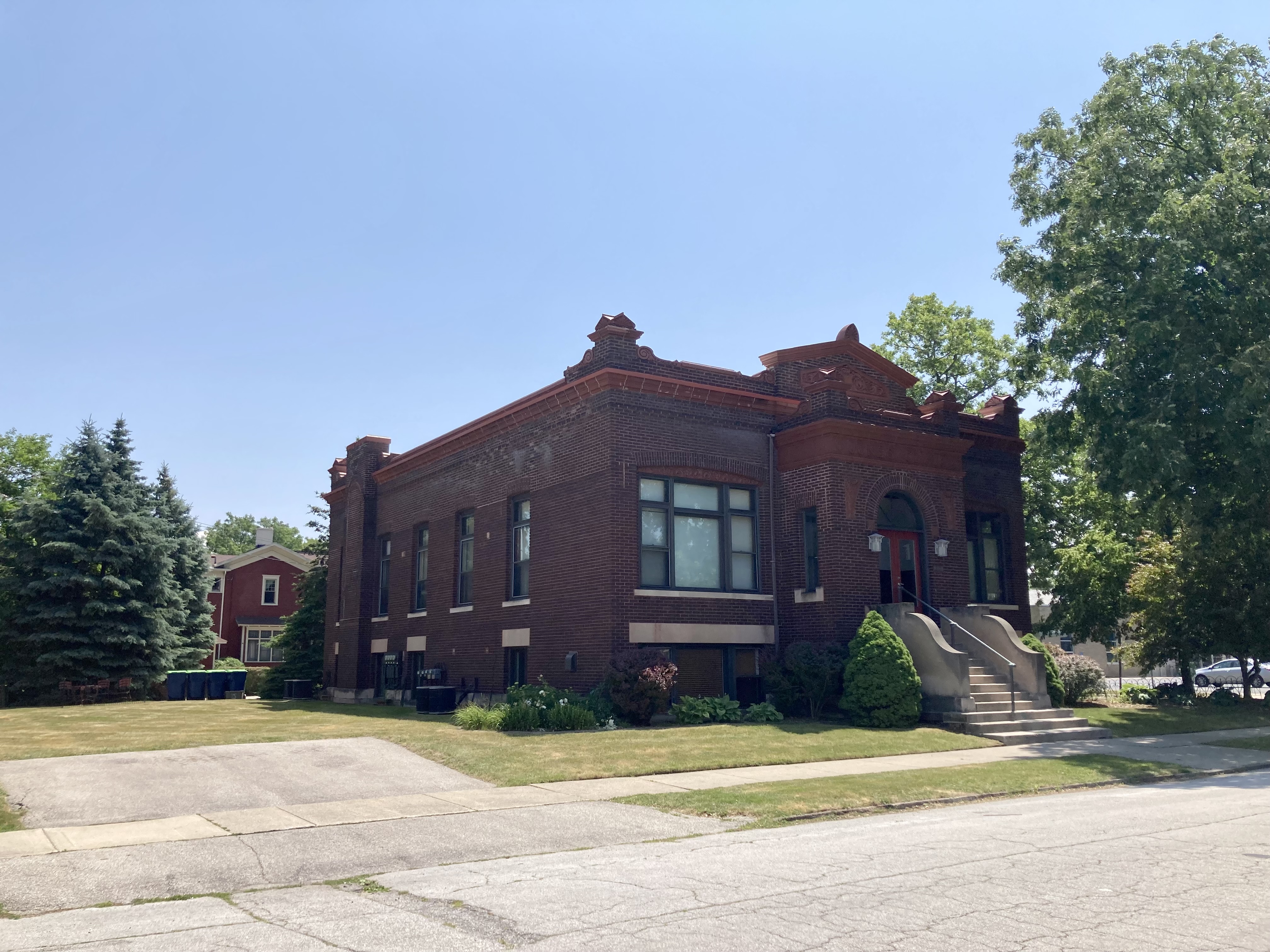
The Centralia
by Jamie Kramer
This first volume of the Bay City Central High School Centralia, recently donated to the museum, was published by students
in 1923. The 1923 Centralia was the first yearbook that combined students from the East and West when Central
High School opened in 1922. The yearbook contains information for all faculty, with many including pictures
and their own signatures.
The class motto for the seniors of 1923 was “not for one, but for all,”
and the flower and colors were Brown-Eyed Susan, and brown and ivory. Each senior’s photograph included a favorite quote.
For instance, included with a picture of Alice Clark, “As chaste as unsunn’d [sic] snow.” Additional
classes are also included with their own sections, as well.
There are many playful writings
that were also written about the students and staff under sections titled Class Prophecy, Chatterbox, and the Scandal Sheet.
There were also several jokes and cartoons throughout.
“Why was Dr.
Kutter so severely reprimanded by the club librarian? They caught him absentmindedly removing the appendix from the book he
was reading.”
Source:
Central High School, The Centralia (Madison, WI: 1923), Bay County Historical Museum Archives.

Second Lt. Robert
Vernon Botwright
by Jill Pfeiffer
Collection
items donated by Russell and Janet Van Camp:
1. Framed picture of Lt. Robert Vernon Botwright
and his Airforce unit
2. Albums - 1944 The Planesman Yearbook Class 44 C - Garden City Airbase
- Garden City, KS, 1943 Mustang 320th Army Air Forces Flying Training Detachment, 44C AAAF Altus, Oklahoma”
3. Framed flag with 48 stars.
Second Lt. Robert Vernon Botwright nicknamed
the “Elf,” was born to Mr. and Mrs. George E. Botwright on December 9, 1922. He grew up in
Essexville and attended Essexville Public Schools, Bay City Central High School, and Bay City Junior College.
The Planesman 44-C included a photograph of Botwright with the following inscription that referred to his college days:
“The “Elf” spent two years at Bay City Jr. College where he developed a love for fun. He
likes his sports and can be counted on to help fun or argument along.” After graduation, Botwright
worked for the National Electric Welding Machine Company.
He was a member of the First Presbyterian Church, Boy Scouts, and the Bay City chapter of DeMolays.
The DeMolays was an international fraternal organization for boys ages 12 to 21 which promoted leadership.
On April 12, 1943, the DeMolays hosted an event at the Masonic Temple that honored the men who were serving in the
Airforce at that time, this included Botwright.
Botwright enlisted in the Army Air Force in December 1942 and was called to service in February
1943. He spent his time as a cadet in Garden City, Kansas, moved to San Antonio, Texas for pilot training,
and received his silver wings at Altus Field, Oklahoma. Botwright was shipped overseas on October 18, 1944,
and on November 6, 1944, was declared missing in action. Upon returning from a mission to bomb Harburg,
Germany, the B-17 “Flying Fortress” that Botwright was co-piloting took a direct hit over Northwestern Germany.
The pilot survived by bailing out and later reported that he saw the plane crash and explode into flames.
He did not see or hear of any signs of Botwright. In November 1945, his parents received confirmation
of his death from the Airforce. Botwright’s body arrived in Bay City on August 31, 1949, and his
funeral was on September 2, 1949. The donated flag was given to the family during the burial at Elm Lawn
Cemetery.
***Do
you have an artifact that you want to be preserved for future generations? Bay County Historical Society is now taking donations.
The item must be 50 years old and tell a story about Bay County.
Sources:
Bay City Times (published as The Bay City Times Extra), “J.C.
Spread” Plans Revealed: ‘Apple Pie Boy and Girl’ to Be Selected” - May 23, 1942: 6
Bay City Times (published as The Bay City Times Extra),
“DeMolays Honor Servicemen: Several Past Officers Now in Armed Forces – April 14, 1943: 8
Bay City Times (published as The
Bay City Times Tribune), “Robert Botwright Missing in Action” – November 27, 1944: 2
Bay City Times (published as The Bay City Times Tribune),
“Lieut. Botwright Listed as Killed” - November 20, 1945: 1 & 2
Bay City Times (published as The Bay City Times Extra), “Lt.
Botwright’s Body Is Returned: Flier Met Death on Bombing Mission” – August 30, 1949: 4
Bay City Times (published as The Bay City Times Extra),
“Obituaries: Botwright” – August 31, 1949: 4
Mustang: 320th Army Air Forces Flying Training Detachment, United State Airforce - 1943
DeMolay International, "About
DeMolay: Who We Are" – found at https://beademolay.org/
By
Sam Fitzpatrick

Dr.
Jerry M. Jones
Born in Parkhill, Ontario in 1871, Dr. Jerry M. Jones studied medicine
at Wayne State University Medical School in Detroit. He moved to Bay City to establish his practice in 1897. In 1910, he returned
to Toronto and married Genevieve Lemoine.
In 1916, Dr. Jones founded the Jones Clinic
at 900 N. Jackson, Bay City. The clinic was designed by Bay City architect, Averton Munger in the Chicago School style. This
style arose out of the new industrial, social, and economic needs of the late 19th and early 20th centuries.
New Industries were taking shape and going ‘up’ was seen as a more viable option as the nation’s cities
and industries, especially in Chicago, grew to exponential proportions. New, taller structures were built with frames made from cast iron and later steel allowing for previously
unreachable heights and interior openness for workers and machinery. This was needed increasingly in Chicago after the Great
fire of 1871, and the city called for more high-density use of land
in the city’s core. Going vertical made sense,
and older revival styles were rejected in favor of this new style which called for the continuity in exterior forms and fluid
interior spaces. This style sought after the human’s physical and social well-being.
While the Jones Clinic is no
skyscraper, Chicago School Style was popular through World War I; right around the time the clinic was finished. Other buildings
in Bay City that utilize this style can be found on Midland Street, such as the Mohr Block. Striking features of the Jones
Clinic are the massive bay windows and the brown brick facade. The foundation was built to support additional levels
if the need ever arrose.
 In 1936, an addition was made to the Jones Clinic to include 14 rooms for physician consultations
and dental division. That same year, The Bay City Times described it as a “modern medical clinic” containing
seven physicians of various specialties, various lights and X-Ray machines, diathermy, cardiograph, and fluoroscope. It contained
a staffed laboratory and a separate dental division with an additional laboratory. The operating room was fully modernized
for the time.
In 1936, an addition was made to the Jones Clinic to include 14 rooms for physician consultations
and dental division. That same year, The Bay City Times described it as a “modern medical clinic” containing
seven physicians of various specialties, various lights and X-Ray machines, diathermy, cardiograph, and fluoroscope. It contained
a staffed laboratory and a separate dental division with an additional laboratory. The operating room was fully modernized
for the time.
In
1947, Jerry M. Jones was honored by his Alma Mater of Wayne State University for 50 years of medical service. He served as
the chief surgeon for the Detroit and Mackinaw Railroad, and he was also the managing director for the Samaritan Hospital
of which he was a founder. He was a lifetime member of the Bay County Medical Society and the American
Medical Association. He also belonged to the Joppa Lodge 315 and the Elf Khurafeh Temple.
After Dr. Jerry M. Jones’s death in 1948,
60 percent interest in the building was left to his son, Dr. Melvin Culver Jones and the remaining 40 percent was willed to
Jerry’s widow, Genevieve.
Dr. Culver “Casey” Jones
Dr. Culver “Casey” Jones was born in Bay City in 1911 and was
a life-long resident. He earned degrees from the University of Michigan, Chicago University, and a master’s degree from
Harvard. In addition, he would graduate from the University of Michigan Medical School in 1945 and serve in the Army Medical
Corps twice.
Among
his many contributions and involvements in the community was serving as a charter member of Studio23/The Arts Center. He was
a board president of the former Samaritan Hospital, a life member of both the Elks Lodge #88 B.P.O.E. and the Bay Medical
Society. He was also a noted environmentalist and liked to spend time in the Upper Peninsula where he owned a home near Grand
Marais and would snowshoe in the winters. He was known to have cared deeply for his friends, family, and animals.
After Dr. Culver “Casey”
Jones’ death in 1982, the building fell into disrepair and was slated for demolition by the City of Bay City.
In 1991, it was purchased by local architect John T. Meyer for $500. He had dreamed of turning the space into loft
apartments. He spent the next four years restoring the building to its former glory. By the mid-1990s, the building was owned
and used as a residential home by men’s clothier Terry Schwartz.
Sources:
“Old clinic getting new life.” By Greta Guest. Bay City Times. April 18, 1994.
“Proposal lets Jones Clinic dodge wrecking crew
ball.” By Elizabeth McKenna. Bay City Times. August 27, 1991.
“Designing Men Personal clothier carriers her tastes to men’s wardrobes,
interior decorating.” By Michael K. Nowlin. Bay City Times. June 1, 2001.
“Jones Clinic Left to Founder’s Son”. The Bay City Times Extra.
August 22, 1948.
“CONTRACTORS
ARE NEARLY THROUGH ON JONES’ CLINIC.” Bay City Times Tribune. October 28, 1916.
“Modern Clinic is Established here”. Bay
City Times. February 23, 1936.
“Surgeon
Stricken”. The Bay City Times Extra. August 10, 1948.
“Bay City man’s legacy to help fund art center”. Bay City Times. April
22, 1999.
“Jones, M. Culver, M.D. Essexville, Michigan”. The Bay City Times. December 17, 1991.
“Physician and arts patron dies at 80”. The
Bay City Times. December 17, 1991.
“City to buy Jones’ Clinic for $75 from state”. The Bay City Times. May 21, 1991.
Miller, Hugh C. Publication. The Chicago School of Architecture:
A Plan for Preserving a Significant Remnant of America’s Architectural Heritage. Washington, District of Columbia: U.S.
Government Printing Office, 1973. chicago-school-of-architecture.pdf (npshistory.com)
1916 Bay City Directories







